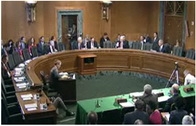Advertisement
Senate Banking Committee hosts hearing on foreclosure progress

Senate Banking Committee Chairman Chris Dodd (D-CT) expressed frustration at a Senate Banking Committee titled, "Preserving Homeonership: Progress Needed to Prevent Foreclosures," that, despite endless assurances, little has been accomplished by way of stemming the tide of foreclosures and he pressed the need for principal reduction to stabilize the housing market, a key element of economic recovery. The Associated Press has reported that “The number of U.S. households on the verge of losing their homes soared by nearly 15 percent in the first half of the year as more people lost their jobs and were unable to pay their monthly mortgage bills.”
Sen. Dodd asked officials from two of the nation’s largest mortgage servicers, Wells Fargo and Bank of America, and officials from the Obama Administration to testify because, in his words, “I’m hoping that, with stakes this high, somebody can explain to me why nothing has changed over the last two years.”
Additional panelists included: The Honorable Herbert M. Allison Jr., Assistant Secretary for Financial Stability, U.S. Treasury; the Honorable William Apgar, Senior Advisor to the Secretary for Mortgage Finance, U.S. Department of Housing and Urban Development; Joan Carty, president and CEO of the Housing Development Fund in Bridgeport, Conn.; Mary Coffin, head of mortgage servicing for Wells Fargo; Allen Jones, default management executive with Bank of America Home Loans; Diane E. Thompson, of counsel, National Consumer Law Center; Curtis Glovier, managing director, Fortress Investment Group; Paul S. Willen, senior economist and policy advisor, Federal Reserve Bank of Boston; and Thomas Perretta, consumer, state of Connecticut.
“It’s almost like Groundhog Day here today," said Dodd as he opened the proceedings. "One of the first hearings I held two years ago when I became Chairman in February of 2007 was on this very matter. I am frustrated, and that’s a mild word to use, that we have to hold this hearing at all. This is disgraceful."
According to the Center for Responsible Lending (CRL), there have been more than a million foreclosures in 2009 alone. Nationally, 9.12 percent of mortgages, nearly one out of 10, were delinquent at the end of the first quarter. Sen. Jack Reed (D-RI) has been urging the Obama Administration to use its leverage to help struggling homeowners by holding banks and loan servicers accountable for requests to help. In June, he sent letters to both Secretary Tim Geithner and Secretary Shaun Donovan, asking them to develop and implement a strategy requiring banks and loan servicers, particularly those that have agreed to participate in the Obama Administration’s foreclosure prevention initiatives, to respond to homeowners in a timely fashion.
“We are here today because we recognize that we are in the midst of a national emergency,” said Sen. Reed, a senior member of the Banking Committee. “The Bush Administration’s limited actions failed to forestall this crisis. The Obama Administration has implemented the Making Home Affordable program and, with the help of Congress, improved the previous Administration’s Hope for Homeowners program. However, too many homeowners are still struggling to access programs and get the help they need."
Sen. Dodd further stated: "Why am I still reading about lost files, under-staffed and under-trained servicers, and hours spent on hold on the phone? Why does the National Foreclosure Mitigation Program tell us that homeowners are waiting an average of six to eight weeks, six to eight weeks, for a response? Why am I still reading stories about homeowners, community advocates, even my own staff acting on behalf of constituents, shuffled from voicemail to voicemail to voicemail to voicemail as they attempt to help people stay in their homes? Why are servicers and lenders refusing to accept principal reduction so that homeowners can start building equity and get the housing market moving again?"
Sen. Reed stressed that the Administration must continue putting pressure on servicers to expand their capacity, make the process more transparent for homeowners, and institute meaningful penalties to hold servicers that fail to perform accountable.
"I look forward to continuing to work with the Administration to improve its foreclosure prevention programs," said Sen. Reed. "However, in this environment in which the national unemployment rate is racing towards 10 percent we have to continue thinking broadly about what types of additional policies are needed to help homeowners. Soon, I plan to introduce foreclosure prevention legislation that would provide mortgage assistance payments to homeowners. I first introduced this idea in 2007 legislation—since then, the need for something like this has only grown more urgent."
Reed’s legislation would provide mortgage assistance payments to homeowners. This program, administered by state housing finance agencies and other entities, would be for homeowners who have lost income through no fault of their own and who have reasonable prospects of employment. Qualified homeowners will receive grants or loans to help make past due mortgage payments and to pay a limited number of future payments. Homeowners whose circumstances simply make keeping the home impossible would be eligible for relocation assistance. The bill would also establish a comprehensive national database to more effectively track foreclosures and delinquencies.
“Additionally, my bill would establish a comprehensive national database to more effectively track foreclosures and delinquencies," said Sen. Reed at the hearing. "It will also address the affordable housing crisis that continues to plague us as the number of foreclosures has increased competition for affordable rental housing. Stabilizing housing is the key to economic recovery, and we must continue to use all of the tools at our disposal to ensure that homeowners get the relief that they need. These are complex issues, and I look forward to discussing these matters of critical importance to our country."
A Webcast of the hearing may be found here.
About the author





